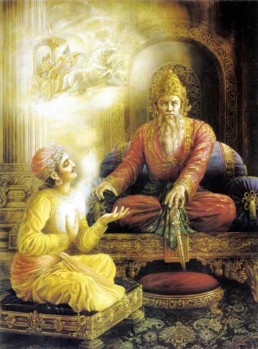Swami Chinmayananda Commentary
What was said in the discourse upon the last stanza will become amply clear by this statement of Arjuna. Here also he bemoans that, as a result of the civil war, the religious traditions of the family will all be lost and when he says so, as I have said earlier, if we understand religion as the “spiritual culture of India,” — the training for which was primarily given in the individual homes — then the stanza becomes self-explanatory. We also know that, after a war there is a sudden cracking up of the existing cultural values in any society. Our modern world, panting and sighing under the burden of its own immoralities and deceits, is an example of how war brings about, not only disabled men with amputated limbs, but also deeper ulcers and uglier deformities in their mental make-up.
In these words, we can detect in Arjuna almost the world’s first conscientious objector to war! In these passages he offers a splendid series of pacifist arguments good for all times!!
Adi Sankara Commentary
Sri Sankaracharya did not comment on this sloka. The commentary starts from 2.10.
The Bhagavad Gita with the commentary of Sri Sankaracharya – Translated by Alladi Mahadeva Sastry
Holy Geeta – Commentary by Swami Chinmayananda
The Bhagavad Gita by Eknath Easwaran – Best selling translation of the Bhagavad Gita
The Bhagavad Gita – Translation and Commentary by Swami Sivananda
Bhagavad Gita – Translation and Commentary by Bhaktivedanta Swami Prabupadha
Srimad Bhagavad Gita Chapter 1 – Verse 43 – 1.43 doshair etaih – All Bhagavad Gita (Geeta) Verses in Sanskrit, English, Transliteration, Word Meaning, Translation, Audio, Shankara Bhashya, Adi Sankaracharya Commentary and Links to Videos by Swami Chinmayananda and others – 1-43

